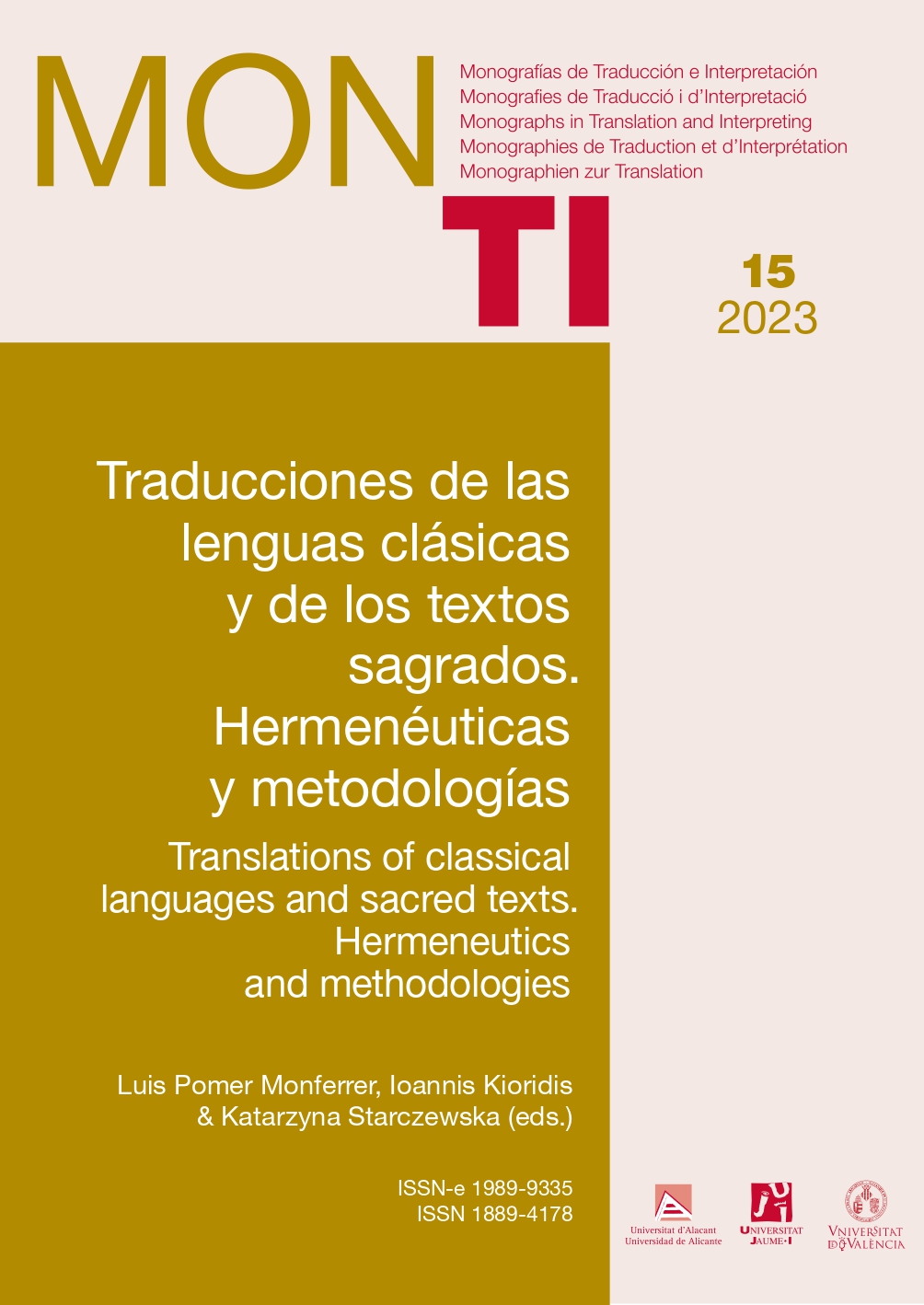La traducción de la ironía en el discurso Sobre la Corona de Demóstenes
Contenido principal del artículo
Resumen
El propósito de este trabajo es ofrecer una aproximación a la traducción al español de la ironía en la obra maestra de Demóstenes —el discurso Sobre la Corona— en el marco de los ataques verbales que el orador dirige a su gran rival político, Esquines.
Descargas
Detalles del artículo
La propiedad intelectual de los artículos pertenece a los autores y los derechos de edición y publicación, a la revista. Los artículos publicados en la revista podrán ser usados libremente para propósitos educativos y científicos, siempre y cuando se realice una correcta citación del mismo. Cualquier uso comercial queda expresamente penado por la ley.
Datos de los fondos
-
Comunidad de Madrid
Números de la subvención PGC2018-093779-BI00;SI3/PJI/2021-00208
Citas
ALCAIDE, Esperanza. (2004) “La ironía, recurso argumentativo en el discurso político.” RILCE 20:2, pp. 169-189.
ANECD. BEKK.= BEKKER, Immanuel (1814-21) Anecdota Graeca I. Berlin: Nauckium.
BARBE, Katharina. (1995) Irony in context. Amsterdam: John Benjamins.
BURGERS, Christian; Margot van Mulken & Peter Jan Schellens. (2011) “Finding irony: An introduction of the Verbal Irony Procedure (VIP).” Metaphor and Symbol 26:3, pp. 186-205.
BURGERS, Christian & Gerard J. Steen (2017) “Introducing a three-dimensional model of verbal irony.” En: Athanasiadou, Angeliki & Herbert Colston (eds.) 2017. Irony in Language Use and Communication. Amsterdam: John Benjamins, pp. 87-108.
BUTCHER, Samuel Henry. (1903 [1966]) Demosthenis orations, v. 1. Oxford: Clarendon Press.
CABANILLAS GONZÁLEZ, Candelas. (2003) “La traducción de la ironía.” En: Muñoz Martín, Ricardo et al. (eds.) 2003. Actas del I Congreso Internacional de la Asociación Ibérica de Estudios de Traducción e Interpretación. Granada: AIETI, pp. 221-231.
DE HALICARNASO, Dionisio. (2005) Sobre Demóstenes. En: Tratados de crítica literaria. Traducción, prólogo y notas de Juan Pedro Oliver Segura. Madrid: Gredos.
DEMÓSTENES. (1968) Sobre la corona. Traducción, prólogo y notas de Julio Pallí Bonet. Madrid: Aguilar.
DEMÓSTENES. (1989) Demóstenes. Discursos políticos I. Traducción, prólogo y notas de Antonio López Eire. Madrid: Gredos.
DEMÓSTENES. (1990) Demóstenes. Discursos. Traducción, prólogo y notas de José Luis Navarro. Madrid: Alianza.
DEMÓSTENES. (1998) Las Filípicas. Sobre la corona. Traducción, prólogo y notas de Antonio López Eire. Madrid: Cátedra.
DGE = Diccionario Griego-Español en línea. Madrid: CSIC.
FORNIELES SÁNCHEZ, Raquel. (2022) “Evidenciales e ironía en Esquines y Demóstenes.” Emerita. Revista de Lingüística y Filología Clásica 90:2, pp. 281-300.
FORNIELES SÁNCHEZ, Raquel. (en prensa) “A first approach to irony in Greek oratory.” En: Giannakis, Georgios et al. (eds.). Historical Linguistics and Classical Philology. Berlin: De Gruyter.
GOODWIN, William Watson. (1904) Demosthenes De Corona. Cambridge: Cambridge University Press.
GRICE, H. Paul. (1975) “Logic and Conversation.” En: Cole, Peter & Jerry L. Morgan (eds.) 1994. Syntax and Semantics: Speech Acts, v. 3. New York: Academic Press, pp. 41-58.
GROEBEN, Norbert & Brigitte Scheele. (1981) “Strategien unei-gentlich-kontrastieven Meinens: Kategorien des Dementis im ironischen Sprechakt.” Deutsche Sprache 9:1, pp. 1-24.
HAVERKATE, Henk. (1985) “La ironía verbal: análisis pragma-lingüístico.” Revista Española de Lingüística 15:2, pp. 343-391.
HAVERKATE, Henk. (1990) “A speech act analysis of irony.” Journal of Pragmatics 14:1, pp. 77-109.
HUTCHEON, Linda. (1994) Irony’s Hedge. The Theory and Politics of Irony. Nueva York: Routledge.
KAMEN, Deborah. (2004) “KINA[I]DOS: A pun in Demosthenes’ On the Crown?” Classical Quarterly 64:1, pp. 405-408.
KNOX, Norman. (1973) “Irony.” En: Wiener, Philip P. (ed.) 1973. Dictionary of the History of Ideas: Studies of Selective Pivotal Ideas, v. 2. Nueva York: Scribner and Sons.
LSJ = LIDDELL, Henry George & Scott, Robert. (1968) A Greek – English Lexicon. 9ª ed. revisada por H. S. Jones. Oxford: Oxford University Press.
MARTÍNEZ LÓPEZ, Juan Antonio & Annette Myre Jørgensen. (2009) Diccionario de expresiones y locuciones del español, Madrid: Ediciones de la Torre.
MOUSSA SASSI, Fatima Zohra. (2020) “Manipulative Use of Affect and Evidential Markers in Legal Discourse.” Language. Text. Society 7:1. https://ltsj.online/2020-07-1-moussasassi.
MUECKE, Douglas Colin. (1969) The Compass of Irony. Londres: Routledge.
MYERS ROY, Alice. (1987) lrony in Conversation. Ann Arbor: University Microfims International.
NORD, Christiane. (1991) Text Analysis in Translation. Amsterdam: Rodopi.
PORTOLÉS, José. (1998) Marcadores del discurso. Barcelona: Ariel.
RONNET, Gilberte. (1971) Étude sur le style de Démosthène dans les discours politiques. Paris: De Boccard.
USHER, Stephen. (1974) Dionysius of Halicarnassus The Ancient Orators 4. On the Style of Demosthenes. Harvard: University Press.
VATRI, Alessandro. (2018) “Implicit, Explicit and ‘Paraphrased’ Irony in Attic Oratory.” Mnemosyne 71, pp. 1053-1061.
VINAY, Jean Paul & Jean Darbelnet. (1958) Stilistique comparée de français et de l’ anglais. Paris: Didier
WOLSDORF, David. (2008) “Eirôneia in Aristophanes and Plato.” Classical Quarterly 58, pp. 666-672.
YUNIS, Harvey. (2001) Demosthenes. On the Crown. Cambridge: University Press.
YUNIS, Harvey. (2005) Demosthenes. Speeches 18 and 19. Austin: University of Texas Press.


